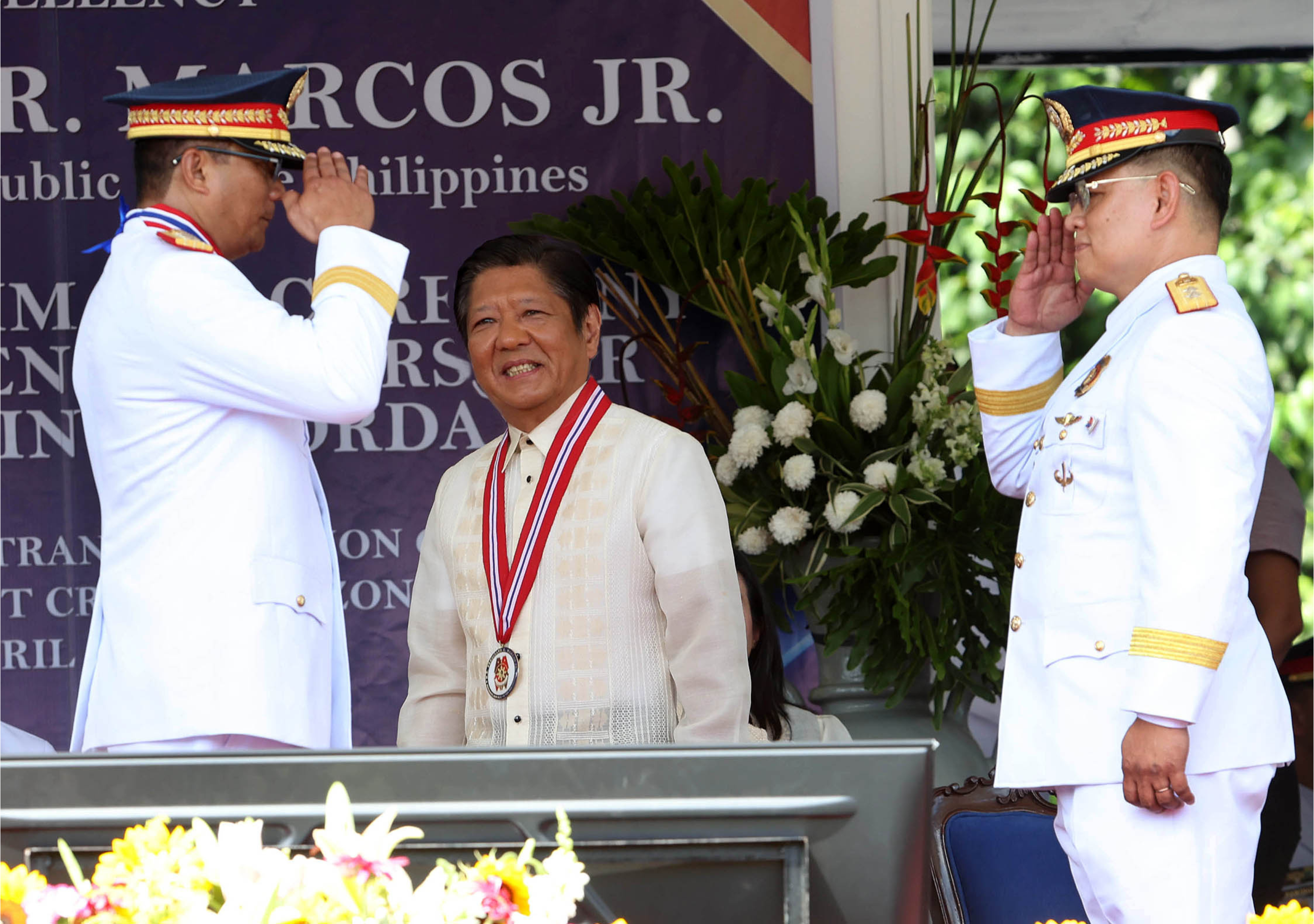New PNP chief’s top task: Fight cybercrime, terrorism

TOP COP President Marcos witnesses the transfer of command of the Philippine National Police from outgoing chief, Gen. Benjamin Acorda Jr. (left), to the organization’s new leader, Gen. Rommel Marbil, at Camp Crame on Monday. MARIANNE BERMUDEZ
MANILA, Philippines — President Ferdinand Marcos Jr. on Monday challenged the newly installed chief of the Philippine National Police to work with other government agencies in curbing what he described as “emerging threats” to national security: cybercrime, transnational crimes and terrorism.
In his speech during the change-of-command ceremony in Camp Crame, the President urged Gen. Rommel Marbil to lead a police force that is “pro-God, procountry, propeople, pro-environment.”
“Let us work closely with you in addressing emerging threats, such as cybercrime, terrorism and transnational crimes,” he said.
READ: Getting to know new PNP chief Maj. Gen. Marbil
READ: PNP turnover rites moved; successor yet to be named
30th PNP chief
Marcos appointed Marbil as the PNP’s 30th chief, coinciding with the retirement of Gen. Benjamin Acorda Jr.
Last month, the President gave the same directive as he met with the government’s security cluster, as the PNP noted the “drastic increase” in cybercrimes over the past 18 months.
READ: Acorda: PNP to tackle rise in cybercrimes
Acorda then presented to the President data showing that swindling was the top cybercrime in the country, with almost 16,000 cases recorded, followed by about 4,900 cases of illegal access and 2,400 cases of identity theft.
Other cybercrimes recorded by the PNP included credit card fraud, data interference, threats, photo and video voyeurism and computer-related fraud, according to PNP data.
Marcos ordered the strengthening of the PNP’s cybersecurity systems by training its personnel and investing in technology.
Evolving responsibilities
The new PNP chief vowed to ensure “continuity and improvement” in the organization under his leadership, as he acknowledged that their scope of responsibilities was evolving in a changing society.
Marbil said they were “seeing new forms of criminality evolve wherever there is an opportunity to exploit the weaknesses that advancement brings.”
“The [PNP] recognizes that effective law enforcement nowadays requires competency and innovation in the use and application of technology to its overall operation and daily work,” he said.
In line with this, Marbil said they would prioritize integrating the PNP Secured, Mobile, Artificial Intelligence-Driven, and Real-Time (Smart) Policing Program and ICT Development Roadmap in their operations, which would include “an active drive” to recruit “a new generation of police officers and support staff” with technical expertise and specialized IT (information technology) skills.
He also vowed that the PNP would be “vigilant and uncompromising” in fighting transborder criminality and terrorism with international partners “to stop these global threats from gaining a solid foothold in our society.”
Caretaker appointment
In his speech at the turnover rites, the President reminded the police force that despite the leadership changes, the PNP’s mission remains the same: “To serve and protect the people.”
Acorda was due to have retired in December but his tenure was extended for three months, or until March 31.
Just a day before Marbil’s appointment, Malacañang—citing a memorandum from Executive Secretary Lucas Bersamin dated March 27—announced that Maj. Gen. Emmanuel Peralta would serve as officer in charge of the PNP starting March 31 “until a replacement is appointed or until otherwise directed by this office.”
Peralta is currently the deputy chief for operations, the second highest post in the PNP, while Marbil’s previous designation was directorate for comptrollership. Both are members of the Philippine Military Academy Sambisig Class of 1991.
Acorda also belongs to the same PMA class.
Marbil, who was born in Manila, previously served as regional police director of Eastern Visayas from August 2022 to May 2023 and director of the Highway Patrol Group from November 2021 to August 2022.
His other assignments included being chief of staff of the Civil Security Group, provincial police director of Agusan del Norte and chief of the Force Intelligence Division.
He will reach the mandatory retirement age of 56 on Feb. 7 next year.
President commends Acorda
The President also lauded the accomplishments of Acorda, who introduced the “five-focused agenda” in the police organization that revolved around “more honest law enforcement operations, enhanced information technology capabilities, and stronger community relations.”
Marcos credited the outgoing PNP chief for his accomplishments, which reportedly led to a recent survey giving a 76-percent trust rating to the PNP, the third most trusted among 25 government agencies in the second quarter of 2023.
But it was also during Acorda’s term that the PNP faced a string of congressional probes due to the alleged involvement of its personnel, including the purported cover-up on the seizure of P6.7 billion worth of “shabu” from one of its antidrug operatives; policemen’s involvement in the shooting and killing of 17-year-old Jemboy Baltazar in Navotas; the mystery behind the missing files of erring police officers; and the gun-toting retired police officer over a road rage incident in Quezon City. INQ